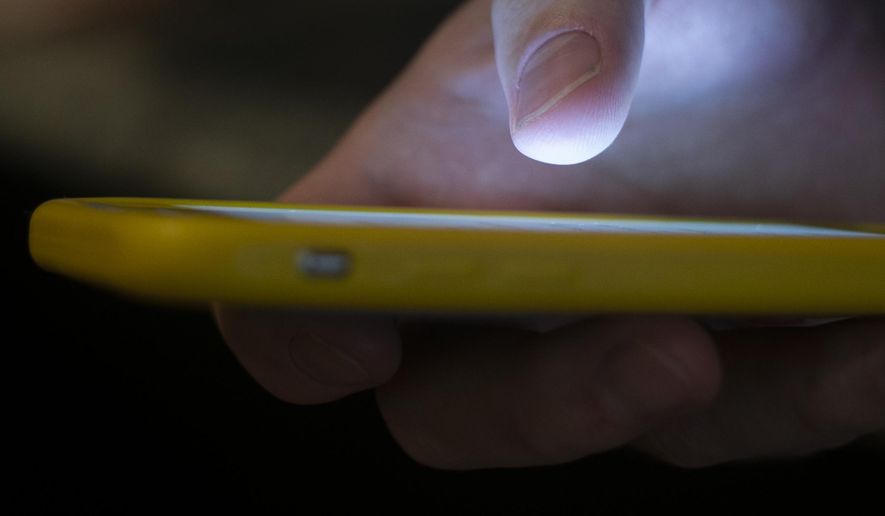Americans with college loans are being targeted by a growing number of scams looking to take advantage of confusion over the Biden administration’s debt-forgiveness plan, government officials warn.
The Federal Communications Commission has pledged to crack down on robocalls asking former students for financial information under the pretext of collecting or forgiving payments.
Consumers are “likely talking to a scammer” if a robocall pressures them to provide money, notifies them of a loan forgiveness fee or directs them to any website other than StudentAid.gov, the FCC said in its enforcement advisory.
The FCC advisory follows separate alerts that the White House, Federal Trade Commission and Department of Education issued last month as federal agencies work to stop the scams.
Officials say fraudsters have flooded U.S. smartphones with calls and texts each time the Biden administration has taken action on student loans. Many of the fake emails, texts, calls and pop-up ads invoke President Biden by name.
The scam wave started Aug. 24, when the president announced his plan to forgive up to $20,000 in debt per borrower for millions of Americans.
Zulfikar Ramzan, chief scientist at Boston-based Aura, said the cybersecurity company received reports of scam phone calls “within hours” of the announcement.
“Since student loan forgiveness was announced by the Biden administration in August, there has been a stark increase in the number of scam calls, emails and sites that are claiming to offer students and alumni debt forgiveness,” Mr. Ramzan said in an email.
The scams follow a pattern of seeking the victim’s financial information or charging a too-good-to-be-true fee in exchange for debt forgiveness.
“Fraudulent parties posing as student loan servicers or the federal government may text you or email you with a link that leads you to a fake site that is designed to steal your personal information,” Mr. Ramzan said. “Do not respond.”
Internet ads touting the scams communicate a false sense of urgency by using slogans such as “act immediately to qualify for student loan forgiveness before the [Biden administration] program is discontinued.”
In a recent review of 242 Google ads related to student loan forgiveness, the nonprofit Tech Transparency Project found that almost 12% were fraudulent.
Security experts say the fraud spikes each time the Biden administration announces changes to the federal student loan process.
On Monday, the Department of Education announced a sweeping overhaul of federal student loan guidelines intended to make debt relief more accessible for borrowers.
The department also has suspended federal student loan payments seven times since pandemic lockdowns started in March 2020, most recently pushing the debt freeze to Dec. 31.
“Scammers like to follow the news and use current events to scam Americans out of their hard-earned money,” said Giulia Porter, a vice president at the anti-spam and text-blocking app RoboKiller.
RoboKiller estimates that 6 billion robocalls and 31 million robotexts related to student loan scams have cost U.S. smartphone users more than $5 billion.
Ms. Porter said the company first identified an uptick in the scams after the president’s announcement in August. That month, Americans received an estimated 611 million robocalls and 9 million robotexts.
RoboKiller estimates that Americans could see another 5%-10% spike in the number of student loan robocalls by the end of this year.
The FCC said Americans who think they have received a scam call should avoid sharing any personal or financial information, hang up and report it to the federal government.
The agency also wants phone companies to crack down on fraudsters.
“We are calling on the phone companies to heighten their vigilance and take decisive measures to block student loan debt scam robocalls,” FCC Chairwoman Jessica Rosenworcel said in a statement. “We are ready to take action in every way we can and throw the book at robocallers who illegally target consumers.”
James Quaid, founder and CEO of the anti-fraud carrier GoTalk Wireless, said student loan scammers see smartphones as the easiest way to reach people.
“As many of us are connected to our phones and now use our devices for all services, private and governmental, it’s an easy way for fraudsters to connect with potential victims,” Mr. Quaid said.
• Sean Salai can be reached at ssalai@washingtontimes.com.




Please read our comment policy before commenting.